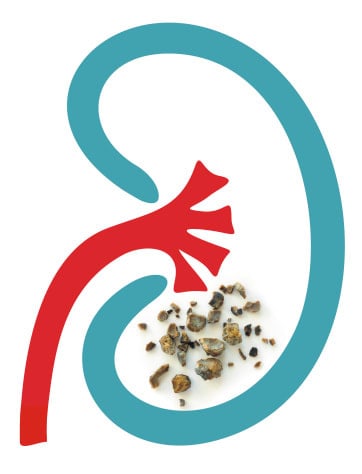Potassium citrate is a mixture of potassium salt and citric acid.
While it’s often used as a food additive, it can also improve heart and bone health and help conditions like kidney stones.
This article looks at potassium citrate and how and when to use this product safely.
What is Potassium Citrate?

Potassium is an essential mineral found in various fiber-rich foods like vegetables, fruits, nuts and legumes.
If you follow a largely plant-based diet, there’s a good chance you’re getting enough potassium. But if your diet includes more processed foods, you may not be consuming an adequate amount.
Unlike other essential nutrients (like calcium, vitamin D and B-vitamins), potassium is not fortified (added) in staple foods. This is due to its rapid impact on blood pressure.
However, when potassium is consumed from natural sources like these, the accompanying fiber slows its absorption. This allows it to safely perform its role in the body.
In supplemental or medication form, potassium is combined with other molecules like carbonate, chloride or hydroxide to form salts.
Potassium linked to citric acid forms potassium citrate.

Potassium citrate structure. Image source.
Roles of Potassium
This mineral serves many purposes in the body, but it mostly acts as an electrolyte that helps control muscle and nerve function.
Potassium is also vital to heart health, urinary function, acid-base balance, gastrointestinal motility and various enzyme reactions.
Because of these roles, it can be used to support a variety of health conditions.
Potassium citrate in particular produces alkalizing effects in the body, helping to balance urinary pH levels.
Summary: Potassium is an essential mineral found in many fiber-rich whole foods. It’s important for various functions in the body like electrolyte and acid-base balance. Potassium citrate is a salt that helps regulate urinary pH levels.
Possible Health Benefits of Potassium Citrate
Potassium citrate offers a few notable health benefits, especially for the kidneys.
Potassium Citrate and Kidney Stones

Potassium citrate is most often used to improve kidney stones.
Citrate specifically helps to remove protons, or positively charged atoms, which reduces acidity in the urine.
Additionally, potassium citrate crystallizes stone-forming salts like calcium oxalate, calcium phosphate and uric acid in the bladder.
Crystallization happens because of two mechanisms of potassium citrate. It increases urine pH, making it more alkaline. It also increases urine citrate levels, which lowers the risk of stone formation.
Studies show that using potassium citrate decreases stone formation and recurrence.
Essentially, it protects against increased urine saturation resulting from high-protein diets.
Citrate in the urine is able to bind to calcium, making it more soluble and less able to create calcium oxalate stones (1, 2, 3, 4, 5).
Overall, maintaining acid-base balance in the bladder is key for preventing all types of kidney stones (6).
A recent Cochrane review found that potassium citrate may help reduce recurrent calcium urinary stones in children. However, many children couldn’t handle the treatment due to adverse side effects. The authors had limited confidence in this finding and expressed the need for more evidence (7).
A study on 57 adults with active kidney stones showed that potassium citrate therapy helped to increase urine pH, citrate and potassium levels compared to placebo. The study concluded that potassium citrate helped reduce stone formation with only two subjects experiencing mild side effects (2).
Potassium Citrate and Strokes

Potassium’s effect on blood pressure and heart rate may help reduce the risk of stroke.
A 12-year prospective study showed that every 390mg increase in dietary potassium led to a 40% reduction in stroke-associated death (8).
Also, a meta-analysis on potassium and cardiovascular risk factors reviewed 22 studies. It found that potassium intake reduced blood pressure in those with hypertension and helped lower the risk of stroke (9).
The FDA is currently collecting data on potassium citrate use and stroke risk.
So far, of the 1,749 people who experienced side effects while on potassium citrate, 15 or 0.86% have had a stroke, especially in older males (10).
Potassium Citrate and Bone Health

There’s mixed evidence on whether potassium citrate is beneficial to bone health.
When the body is too acidic (often the case when eating the Standard American Diet), calcium is pulled from the bones to help alkalinize the blood.
Therefore, it’s important to maintain proper pH balance for bone health, even if your calcium intake is adequate (11).
In one study, 52 adults supplemented with 0, 2345 or 3519 mg/day of potassium citrate for 6 months. The researchers found that 3519mg/day helped improve calcium balance, which could theoretically protect the bones (12).
Another study saw significant increases in bone mineral density (BMD) in healthy elderly people without osteoporosis who took 2345mg of potassium citrate for 24 months. They also received calcium and vitamin D supplements, which may have played a role as well (13).
In healthy, postmenopausal women, however, the use of supplemental potassium citrate over two years didn’t help reduce bone turnover or increase BMD (14).
These results contrast with the evidence found in a laboratory study, which showed that potassium citrate could prevent osteopenia (low BMD) progression (14, 15).
Summary: Potassium citrate can help prevent kidney stone formation, and may also reduce the risk of a stroke. There is also conflicting evidence on whether it can improve bone health. Overall, it’s safest to consume potassium from food sources.
Potassium Citrate Recommendations

This product should be used under medical supervision.
Prescription potassium citrate is often sold under the trade name Urocit-K, although generic forms are available.
It can also be purchased as a nutritional supplement on its own or within a multivitamin/mineral formulation.
Below is a list of tips to follow when using potassium citrate:
- Always take it with food
- Space it out into multiple doses throughout the day
- Take it with at least 8 oz. of water
- Do not crush or split the tablets
- Do not use in conjunction with salt substitutes, which often contain potassium
- Do not change your dose without consulting your doctor
Dosing
Dosage amounts will vary by person.
In general, healthy adults require 4.7 grams of potassium per day.
With hypokalemia (low potassium levels), dosing increases to treat and prevent the deficiency. Serum potassium levels should stay between 3.5 and 5 mEq/L.
Dosing can also be monitored based on urinary citrate levels, which should be between 320-640mg/day.
You should not exceed 7,819mg per day or serious health consequences may result.
Summary: Only use potassium citrate as recommended by a medical professional. They will help find the appropriate dose for you to keep serum potassium and urinary citrate levels in balance.
Side Effects of Potassium Citrate

Many side effects can develop while using potassium citrate.
Blood and urine testing, as well as electrocardiographs (ECG), can assess your health status while using potassium citrate.
Large doses over the recommended amount may cause cardiac arrhythmia.
Other side effects include:
- Allergic reactions
- Bloody or black stools
- Confusion, dizziness
- Irregular heart rate, chest pain, increased blood pressure
- Muscle twitching
- Seizures
- Restlessness, irritability
- Numbness in hands/feet
- Stomach pain
- Painful swallowing
- Unusual bleeding/bruising
- Unusual weakness
Report these side effects to your doctor.
Who Should Avoid Potassium Citrate
Those with the following medical conditions should avoid potassium citrate:
- Severe kidney disease
- Heart damage
- Addison’s disease
- High levels of potassium or sodium in the blood
- Severe dehydration
Discuss with your doctor the safety and appropriateness of using potassium citrate with the following conditions:
- Diabetes
- Heart disease
- Low blood calcium levels
- Kidney disease
- Stomach ulcers
- Swallowing difficulty
- Urinary tract infections
- Chronic diarrhea
- Pregnant or trying to get pregnant
- Breastfeeding
- Allergy to potassium citrate or other preservatives
If you are using certain medications or supplements, let your doctor know prior to starting a potassium citrate regimen.
Many commonly used products interact with potassium citrate including NSAIDS, antacids, cold/allergy medications, aspirin and diuretics.
Also, many nutritional supplements like multivitamins and mineral formulas contain potassium. Be sure to report their use to your doctor to avoid overdosing.
Summary: High-risk side effects can occur when using potassium citrate, so it’s important to be closely monitored by a health professional. Report all medications and supplements you’re taking to avoid interactions or overdosing. Those with certain severe medical conditions impacting the heart, adrenals or kidneys should avoid using potassium citrate.
Potassium Citrate for Dogs
Dog owners may use potassium citrate to help their pup with urinary stones and painful or frequent urination.
One study fed 12 healthy dogs either a standard diet or one with 150mg potassium citrate per kilogram of body weight, twice per day.
The authors found that supplementation had a limited effect, with a slight increase in urine pH of 0.2 units. Either way, if you choose to supplement, they recommend you do so with food, twice per day (16).
Overall, the research is sparse on this topic despite various pet-friendly potassium citrate products available on the market. Talk with your veterinarian if you’re considering using potassium citrate for your pet.
Summary: Potassium citrate can be used to help dogs with urinary issues, though there is limited research to prove this. Talk with your vet for safety and dosing recommendations.
Should You Use Potassium Citrate?
Potassium citrate can help people, and sometimes dogs, with treating kidney stones.
It may also help reduce the risk of stroke, but must be used with caution and under the supervision of a medical professional.
The evidence for its effects on bone health are inconclusive, so it’s best to play it safe and obtain adequate potassium intake from food sources.
Dosing is based on individual need to help maintain healthy serum potassium levels.
A wide array of serious side effects can result if used improperly. If you suffer from heart, kidney or adrenal disease, ask your doctor if potassium citrate is appropriate for you.

